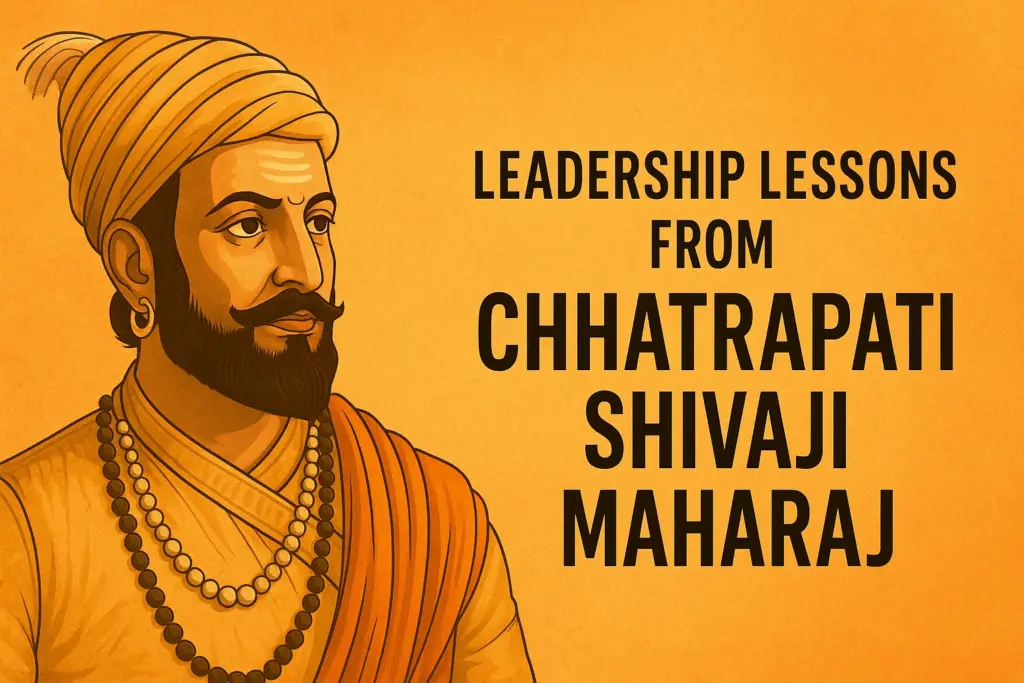Introduction
In a world where leadership paradigms are constantly evolving, revisiting history reveals enduring wisdom. Among the greatest historic leaders, Chhatrapati Shivaji Maharaj stands tall as a beacon of courage, strategy, governance, and people-first leadership. Revered as a visionary warrior-king who founded the Maratha Empire in the 17th century, his leadership style continues to inspire business leaders, strategists, educators, and military thinkers across the globe.
This blog delves into leadership lessons from Chhatrapati Shivaji Maharaj, drawing insights from his governance, military acumen, and inclusive administrative strategies. His legacy goes far beyond battles—it’s a blueprint for value-driven, strategic leadership in modern contexts.
Visionary Leadership Rooted in Purpose
Chhatrapati Shivaji Maharaj’s leadership journey was founded on a clear, purposeful vision: establishing a sovereign Maratha kingdom that was just, efficient, and independent from Mughal dominance.
- Clarity of purpose: Shivaji had a well-articulated goal—to build a Hindu Swarajya (self-rule)—which helped unify a diverse population.
- Mission-led leadership: His actions were always aligned with his long-term vision, making him an inspirational figure even amidst adversity.
Modern leaders can learn that a strong purpose is the bedrock of sustainable leadership.
Strategic Thinking and Military Innovation
One of Shivaji’s most celebrated traits was his strategic brilliance in warfare, especially his mastery of guerrilla tactics.
- Guerrilla warfare expert: Shivaji pioneered unconventional warfare in India—ambushes, surprise attacks, terrain-based planning—which helped him defeat larger, better-equipped armies.
- Fort architecture as strategic assets: He built and fortified over 300 forts including Raigad, Pratapgad, and Sinhagad, using topography as a defense multiplier.
- Adaptability in strategy: Shivaji modified tactics based on changing threats, never clinging to rigid plans.
Global Parallel: Sun Tzu and Napoleon
Like Sun Tzu, Shivaji emphasized understanding terrain and psychology in battle. His decentralization and troop autonomy echoed Napoleon’s corps system. His agility outmatched rigid empires—a hallmark of timeless strategy.
Decentralized and Empowering Administration
Shivaji’s leadership wasn’t confined to the battlefield. He was an institution builder, emphasizing decentralization and empowerment.
- Ashtapradhan Mandal: He created a council of eight ministers with distinct portfolios, ensuring specialization and checks-and-balances.
- Local governance: Villages had autonomy under central supervision, allowing faster decision-making and accountability.
- Merit-based leadership: Promotions were based on competence, not caste or lineage—a revolutionary idea for his time.
This model is reflected today in modern flat organizations, where empowerment and autonomy drive innovation and accountability.
Inclusive and Ethical Governance
Shivaji Maharaj is often celebrated for his values-based leadership, rooted in justice, respect, and empathy.
- Religious tolerance: Despite being a devout Hindu, Shivaji employed Muslims in key military and administrative roles. He never imposed religious conversions.
- Protection of women and civilians: His forces were strictly prohibited from harming civilians or desecrating temples and mosques.
- Code of conduct: His personal ethics shaped his army’s discipline, fostering respect even among enemies.
These practices laid the foundation for ethical leadership, a principle increasingly vital in today’s corporate governance and politics.
Communication and Psychological Intelligence
- Inspiring charisma: Shivaji could rally people from different backgrounds with persuasive speeches and clarity of purpose.
- Intelligence network: He maintained an extensive spy network, understanding the pulse of his rivals and the morale of his people.
- Emotional intelligence: He empathized with his people, listening to grievances and valuing feedback—an attribute central to modern transformational leadership.
Leadership Under Adversity
True leadership is tested in crisis. Shivaji’s life was a constant challenge—threats from Mughals, betrayal by allies, resource limitations.
- Escape from Agra: His daring escape from Aurangzeb’s custody in 1666 is legendary—a feat of cunning and courage.
- Persistence and resilience: Despite repeated setbacks, he rebuilt his army, reclaimed forts, and regained the trust of his people.
These stories resonate with modern entrepreneurs and leaders who face disruption, competition, and pressure. Shivaji’s example proves that resilience is the backbone of enduring leadership.
Legacy: A Global Leadership Inspiration
Shivaji’s leadership style has been admired not just in India, but globally. His ability to combine strategy, governance, ethics, and communication makes him a universal case study.
- Comparative insight: Like George Washington, Shivaji emphasized people’s liberty and governance by consent.
- Global military schools: His guerrilla tactics are studied in defense institutions for their brilliance in asymmetrical warfare.
Infographic Suggestion
- Visionary Purpose
- Strategic Innovation
- Decentralized Empowerment
- Ethical Governance
- Communication Mastery
- Resilient Mindset

Strategic Forts of Shivaji Maharaj and Their Roles in Military Defense
FAQ: Shivaji Maharaj’s Leadership – AEO Section
Q1: What leadership qualities made Shivaji Maharaj successful?
A: Shivaji Maharaj’s success stemmed from his visionary purpose, innovative strategies, ethical governance, inclusivity, and ability to inspire through adversity.
Q2: How are Shivaji Maharaj’s strategies relevant today?
A: His guerrilla warfare, decentralized administration, and values-first leadership offer timeless insights for modern business, governance, and military strategy.
Q3: Was Shivaji Maharaj a religious leader?
A: No, he was a secular ruler. While spiritually grounded in Hinduism, Shivaji championed religious tolerance and included Muslims and Christians in key positions.
Q4: What global leaders shared similarities with Shivaji Maharaj?
A: Global parallels include Sun Tzu (strategic warfare), Napoleon (decentralized command), and George Washington (self-rule and justice).
Q5: How did Shivaji Maharaj empower his people?
A: He practiced merit-based appointments, empowered village leaders, and created responsive administrative systems that reflected grassroots needs.
Conclusion
Chhatrapati Shivaji Maharaj’s leadership is not just a chapter in Indian history—it is a living manual for modern leaders. Whether you’re a CEO, military officer, educator, or student, his legacy offers powerful lessons in resilience, ethics, strategy, and inclusivity.
Explore how timeless leadership principles from Chhatrapati Shivaji Maharaj can inspire your personal, professional, or organizational journey—learn from history to lead with courage and clarity.
